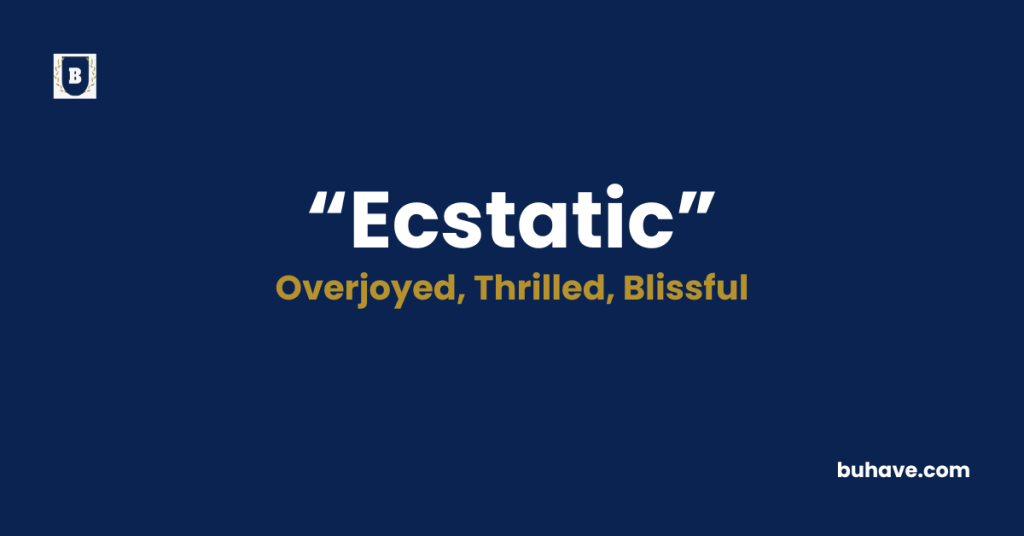The word ‘Ecstatic’ (Adjective) describes a state in which someone is filled with intense joy, happiness, or excitement. This emotion is usually experienced when something truly delightful or surprising has happened. in this guide, you’ll learn the full definition, synonyms, antonyms, etymology, and real-life examples of how to use ‘Ecstatic’ correctly in sentences.
Ecstatic Explained in Depth
A complete and detailed guide to the words Ecstatic including meaning, definition, examples, etymology, synonyms, and antonyms.
Meanings of Ecstatic
The word “ecstatic” is often used when a strong feeling of joy or happiness is being experienced. It is commonly associated with moments that are filled with excitement or intense emotional pleasure. For example, someone might be described as ecstatic when they are given good news or when a long-awaited event is finally celebrated.
Definition:
Ecstatic is a word that is used to describe a state in which someone is filled with intense joy, happiness, or excitement. This emotion is usually experienced when something truly delightful or surprising has happened. For instance, a person might be described as ecstatic when a long-awaited dream is finally achieved.
Etymology:
The word “ecstatic” was originally formed from the Greek word ekstasis, which means “a standing outside oneself.” In ancient times, this term was used when someone was seen to be in a state of rapture or intense emotion, as if they had been lifted out of ordinary awareness. Over time, the word was adopted into Late Latin as ecstaticus, and later into Middle French and English. By the 16th century, the word “ecstatic” had already been used in English to describe someone who was overwhelmed with emotion, especially joy or religious experience.
As the centuries passed, its use became more focused on expressing powerful happiness and excitement.
Example Sentences:
- The crowd was filled with ecstatic excitement as the band took the stage.
- His face was lit up with an ecstatic expression the moment he saw the surprise.
- Their wedding day was remembered as an ecstatic celebration full of love and laughter.
Ecstatic Synonyms:
Ecstatic Antonyms:
- Miserable
- Disappointed
- Sad
- Unhappy
- Depressed
- Downcast
- Melancholy
- Discouraged
- Heartbroken
FAQs about Ecstatic
Here’s a FAQ-style guide about the word “Ecstatic”
1. What does “ecstatic” mean?
“Ecstatic” is an adjective that describes a state of overwhelming joy, happiness, or excitement. It suggests an intense emotional experience that goes beyond simple pleasure.
2. How is “ecstatic” used in a sentence?
- “They were ecstatic about the birth of their first child.”
- “The fans were ecstatic after the team’s surprise win.”
3. What are some synonyms for “ecstatic”?
- Overjoyed
- Elated
- Thrilled
- Delighted
- Exultant
- Rapturous
4. Is “ecstatic” a positive word?
Yes, absolutely. It conveys intense joy, celebration, or emotional high points, and is always used positively.
5. What is the noun form of “ecstatic”?
The noun is ecstasy.
Example:
- “She jumped in ecstasy when she heard the news.”
- “The crowd was in a state of ecstasy after the performance.”
6. What is the difference between “happy” and “ecstatic”?
- Happy is a general, everyday feeling of contentment.
- Ecstatic is a powerful surge of happiness, often triggered by major events or news.
Example:
- “I’m happy with my meal.”
- “I’m ecstatic about the promotion

















